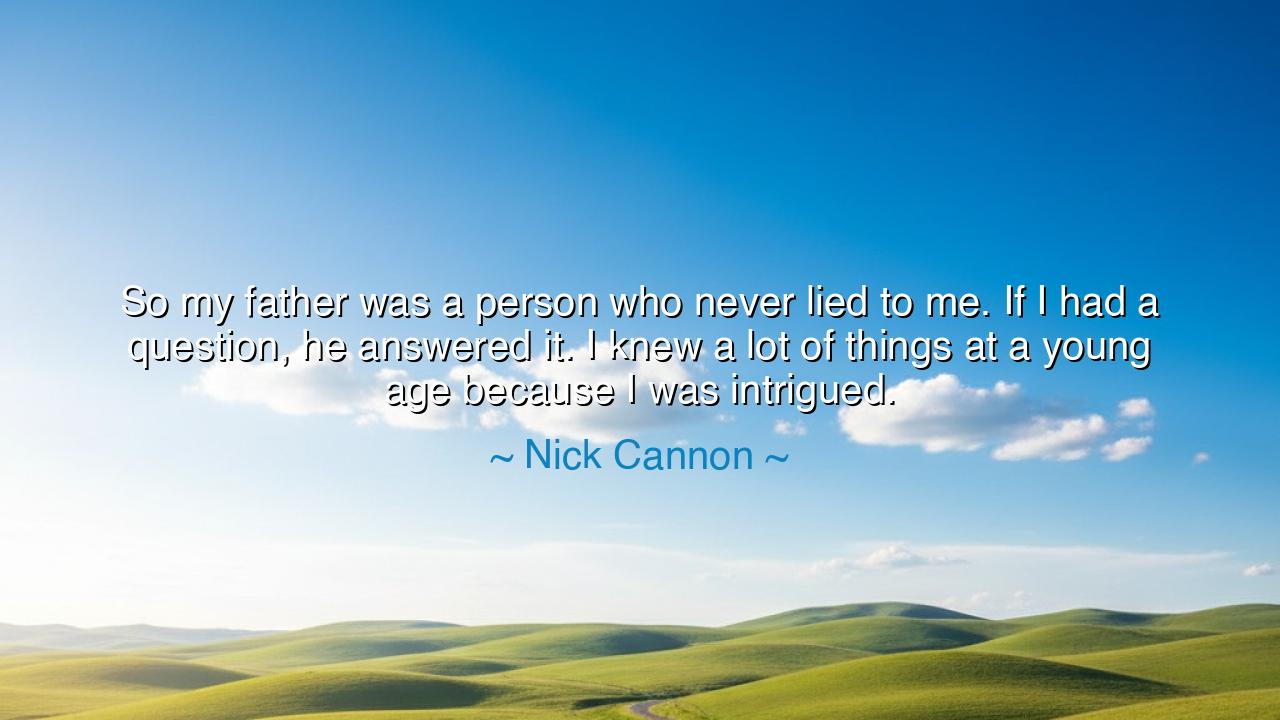
So my father was a person who never lied to me. If I had a
So my father was a person who never lied to me. If I had a question, he answered it. I knew a lot of things at a young age because I was intrigued.






The words of Nick Cannon, “So my father was a person who never lied to me. If I had a question, he answered it. I knew a lot of things at a young age because I was intrigued,” are more than the reflection of a son—they are a tribute to the sacred bond between truth and trust, between father and child. In these simple sentences lies a timeless principle: that honesty, spoken with love, is the foundation of wisdom. A father who refuses to lie becomes not only a guardian but a guide, shaping not just the mind of his child, but the very character of his soul. Truth, when given early, becomes the light by which a young spirit learns to walk without fear.
Nick Cannon, known for his humor, music, and creative spirit, reveals here the quiet power of his upbringing. Behind his confidence and curiosity stands the figure of a man who chose truth over comfort, who understood that children are not to be shielded from reality, but prepared for it. In answering every question with honesty, Cannon’s father gave him not merely knowledge, but respect. For when a father speaks truth to his child, he tells them: you are worthy of knowing; you are capable of understanding. In that sacred act of transparency, a foundation of lifelong trust is laid. It is a bond that does not waver, because it was never built upon illusion.
The ancients, too, held this wisdom close. The philosopher Plutarch once wrote that the role of a father was not only to give life but to educate the soul through truth. Falsehood, he said, is a poison that corrodes the moral heart. To raise a child upon lies, even gentle ones, is to set their feet upon unstable ground. For when the illusions fall—as all falsehoods eventually do—the child must rebuild not only their understanding, but their faith in the one who taught them. Cannon’s father, by contrast, chose the harder but nobler path: to let his son see the world as it was, in all its beauty and harshness, trusting that knowledge would awaken wisdom rather than fear.
There is an ancient story of Diogenes, the Greek philosopher who sought truth above all else. When asked why he spent his life searching for honesty in men, he replied, “Because truth is the beginning of every virtue.” So too did Cannon’s father embody this principle—not as a philosopher in the marketplace, but as a father in the home. His refusal to lie was an act of love, a way of shaping his son into a man who would question, seek, and learn without shame. It is no wonder that young Nick became “intrigued,” for curiosity is the child of truth. When truth is freely given, the mind awakens to its own power; it begins to thirst for more.
In this way, truthful fatherhood becomes a sacred form of teaching. It is not merely about facts, but about forming the moral compass that guides a life. A child who is told the truth learns to trust reality, to navigate the world not by wishful thinking, but by discernment. Such a child grows into an adult who does not fear questions, who welcomes learning, and who speaks truth to others in turn. Lying to protect may feel merciful, but it teaches fear and dependence; telling the truth with love teaches courage and wisdom. The father who answers with honesty says to his child: I trust you with reality, and I trust myself to walk beside you through it.
We can see this principle echoed in the life of Abraham Lincoln, whose greatness was not only political but moral. His mother, Nancy Hanks Lincoln, and later his stepmother, Sarah Bush Lincoln, taught him to value truth above all. They did not soften the hardship of frontier life, but showed him its lessons with clarity and love. That upbringing built in him a mind that questioned and a spirit that endured. When he became president, his honesty—often called “the purest in politics”—was not born of ambition, but of upbringing. He had been taught, as Cannon was, that truth is not something to be feared but embraced.
Thus, the lesson of Nick Cannon’s words reaches beyond the bond of one father and one son—it is a teaching for all who raise, guide, or influence others. Honesty is not cruelty; it is compassion in its highest form. To tell the truth is to give strength; to hide it is to withhold growth. Every parent, teacher, or mentor must remember: children are not empty vessels to be filled with illusions, but sparks waiting for truth to ignite them. When they ask questions, do not fear to answer. If they seek knowledge, let it be given freely, for curiosity is the flame by which humanity advances.
So, my listener, take this wisdom into your heart. If you are a parent, be as Cannon’s father—never lie to those who trust you most. Speak gently, but speak truthfully, for the truth you share today becomes the strength your children will carry tomorrow. If you are a child grown, remember the gift of honesty given to you, and pass it forward. In this way, each generation purifies the next. For truth is the breath of wisdom, and honesty the seed of greatness—and when planted early, it grows into a forest of integrity that shelters the whole of mankind.






AAdministratorAdministrator
Welcome, honored guests. Please leave a comment, we will respond soon